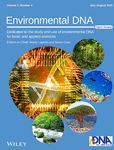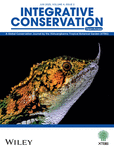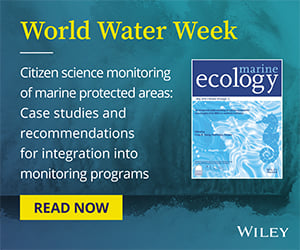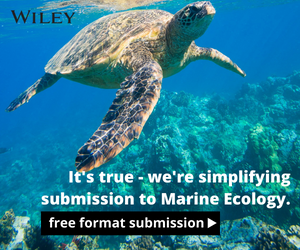Aims and Scope
Marine Ecology publishes original contributions on the ecology of marine populations, communities and ecosystems and promotes studies that increase our understanding of natural marine systems. The journal publishes both experimental and field studies, welcoming papers of all kinds that provide empirical findings of interest to a worldwide readership of ecologists. Papers of local interest or outside the scope of the journal might be rejected without review, unless they provide insights into the processes controlling ecological patterns in space or time.
Marine Ecology does not publish papers on freshwater systems or organisms.
Experimental studies in the lab or field that explore ecological effects of stressors, including anthropogenic ones, on marine organisms are welcome. Such work, however, should be based on observed phenomena, measured empirically. For example, a study showing shifts in species distribution with changing sea temperatures would be appropriate, as would an experimental or correlative study of ocean acidification on marine organisms or communities.
In summary, Marine Ecology is committed to publishing papers from all parts of the world and covering a broad range of fields and approaches. The journal welcomes papers on all aspects of science that help us understand the processes underlying ecological patterns and processes in the sea. Studies may employ a wide assortment of approaches, including, but not limited to, molecular biology, genetics, biochemistry, physiology, evolution, field manipulations, biogeography, phylogeography, embryology, demography, behavior, and oceanography. Some areas, currently of high interest, include the following:
Impacts of environmental change on marine ecosystems, species, populations and communities
Marine ecological trends, drivers and regime shifts
Marine molecular ecology
Marine chemical ecology
Historical marine ecology and marine paleoecology
Ecology of Mediterranean Marine ecosystems
Marine ecological resilience
Microbial-macrobial interactions, holobionts and marine microbiomes
Seagrass and vegetated habitat ecology
Ecosystem connectivity
Benthic-pelagic coupling
Ecology of species invasions
Marine macroecology
Marine natural capital and ecosystem services
Ecology of seamounts and canyons
Chemosynthetic ecosystems
Recruitment ecology
Symbiosis
Biodiversity
Ecology of coral reefs
Types of Contributions
Marine Ecology publishes five kinds of contributions:
Research Papers
We seek original contributions on the structure and dynamics of marine benthic and pelagic ecosystems, populations and communities, including the links between ecology and evolution of marine organisms. We also welcome short articles that present particularly novel or exciting results or offer new methodological approaches.
Thinking Beyond the Data
The forum 'Thinking Beyond the Data' encourages theoretical and speculative contributions presenting novel ideas and/or syntheses or challenging hypotheses on the functioning of marine systems and their evolutionary history. In science, new insights and seminal views often anticipate or precede their verification, while producing in the scientific community an impressive intellectual turmoil that eventually leads to significant advances in knowledge. To date, there are few public opportunities to articulate those views and to share them with the scientific community. Thinking Beyond the Data is an attempt to give voice to such ideas if they can be consistently and clearly proposed, even when they are still in their embryonic phase. The format is wide open, and contributions will range from comments as short as 2 printed pages, to reviews up to 15 printed pages long. The title should preferentially be provocative, and it is expected that the author will briefly expose the current view (with citations) and understanding of the specific issue to introduce his/her point of view. The papers should pose new hypotheses to be tested or key questions to be answered. Authors should try to illustrate their ideas with figures or diagrams, while providing data or evidence (published or unpublished) on which the construct is based, thus providing readers and editors the opportunity to check for consistency.Because the aim of Thinking Beyond the Data is to stimulate scientific debate on a broad range of issues in the ecological and evolutionary sciences, and to open new perspectives, the review process will be both internal (within the journal’s Editorial board) and external. Acceptance will be based largely on the clarity and consistency of the argument, as well as the pertinence to leading themes and aims of the journal. The journal strives to process Thinking Beyond the Data manuscripts within four weeks, from receipt to final acceptance or rejection.
Special Topics
A collection of papers (4-12) addressing a single theme, related issues, or regional investigations will be considered for publication in a special section or a dedicated volume. A special topic section may be initiated by a Guest Editor (often the organizer of a scientific conference seeking a publication venue), or may represent a collection of general submission papers grouped by the Editors. This venue may be an appropriate outlet for research emerging from workshops, multi investigator projects, or long-term studies. It is also a venue for publishing collections of papers on climate, conservation, fishery science, etc. that might not be suitable for regular volumes of the journal. If you are interested in initiating a special topics section and in serving as Guest Editor, please contact the journal editors. Provide a one- paragraph description of the theme and a list of contributors with potential manuscript titles.
Review Articles
We publish review articles and syntheses on any theme relevant to the journal. A review must not only present the work of others but must provide a synthesis that generates novel interpretations, reveals information gaps, and identifies future research directions. Authors considering submission of reviews should first consult the editor. Please provide an abstract or outline of the proposed review.
Book Reviews
Marine Ecology publishes several book reviews each year. Please contact book review editor Michael Stachowitsch if you are interest in providing a book review or recommending a book for consideration. Only books on marine topics of broad general interest will be considered.
Free Online Access in the Developing World
Free online access to this journal is available within institutions in the developing world through the AGORA Initiative with the United Nations Food and Agriculture Organization (FAO), and the OARE Initiative (Online Access to Research in the Environment) with the UN Environment Programme (UNEP).
NIH Public Access Mandate
For those interested in the Wiley-Blackwell policy on the NIH Public Access Mandate, please visit our policy statement.
Keywords
marine ecology, ecology, marine, organisms, ecosystem, pelagic, benthic, underwater, observation, ecophysiology, evolution
Abstracting and indexing information
- Academic Search (EBSCO Publishing)
- Academic Search Alumni Edition (EBSCO Publishing)
- Academic Search Premier (EBSCO Publishing)
- AgBiotech News & Information (CABI)
- AgBiotechNet (CABI)
- Animal Breeding Abstracts (CABI)
- Biocontrol News & Information (CABI)
- Biological Abstracts (Clarivate Analytics)
- BIOSIS Previews (Clarivate Analytics)
- CAB Abstracts® (CABI)
- CAS: Chemical Abstracts Service (ACS)
- Current Contents: Agriculture, Biology & Environmental Sciences (Clarivate Analytics)
- Environment Index (EBSCO Publishing)
- GEOBASE (Elsevier)
- GeoRef (AGI)
- Global Health (CABI)
- Grasslands & Forage Abstracts (CABI)
- Helminthological Abstracts (CABI)
- Horticultural Science Abstracts (CABI)
- InfoTrac (GALE Cengage)
- Irrigation & Drainage Abstracts (CABI)
- Journal Citation Reports/Science Edition (Clarivate Analytics)
- Leisure Tourism Database (CABI)
- Leisure, Recreation & Tourism Abstracts (CABI)
- Nematological Abstracts (CABI)
- Plant Breeding Abstracts (CABI)
- Plant Genetic Resources Abstracts (CABI)
- Review of Medical & Veterinary Entomology (CABI)
- Review of Medical & Veterinary Mycology (CABI)
- Science Citation Index (Clarivate Analytics)
- Science Citation Index Expanded (Clarivate Analytics)
- SCOPUS (Elsevier)
- Soils & Fertilizers Abstracts (CABI)
- VINITI (All-Russian Institute of Science & Technological Information)
- Weed Abstracts (CABI)
- World Agricultural Economics & Rural Sociology Abstracts (CABI)
- Zoological Record (Clarivate Analytics)







